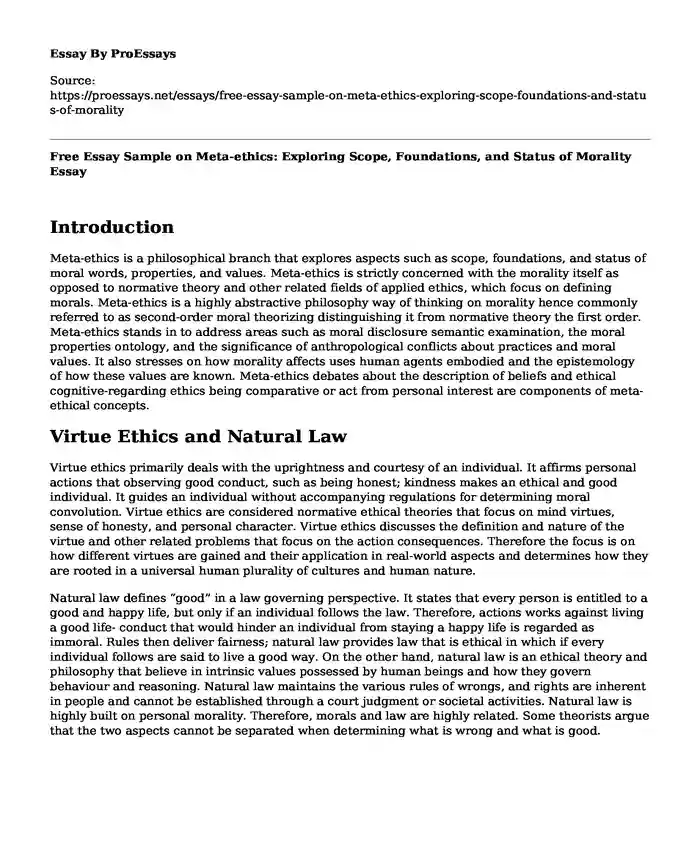Introduction
Meta-ethics is a philosophical branch that explores aspects such as scope, foundations, and status of moral words, properties, and values. Meta-ethics is strictly concerned with the morality itself as opposed to normative theory and other related fields of applied ethics, which focus on defining morals. Meta-ethics is a highly abstractive philosophy way of thinking on morality hence commonly referred to as second-order moral theorizing distinguishing it from normative theory the first order. Meta-ethics stands in to address areas such as moral disclosure semantic examination, the moral properties ontology, and the significance of anthropological conflicts about practices and moral values. It also stresses on how morality affects uses human agents embodied and the epistemology of how these values are known. Meta-ethics debates about the description of beliefs and ethical cognitive-regarding ethics being comparative or act from personal interest are components of meta-ethical concepts.
Virtue Ethics and Natural Law
Virtue ethics primarily deals with the uprightness and courtesy of an individual. It affirms personal actions that observing good conduct, such as being honest; kindness makes an ethical and good individual. It guides an individual without accompanying regulations for determining moral convolution. Virtue ethics are considered normative ethical theories that focus on mind virtues, sense of honesty, and personal character. Virtue ethics discusses the definition and nature of the virtue and other related problems that focus on the action consequences. Therefore the focus is on how different virtues are gained and their application in real-world aspects and determines how they are rooted in a universal human plurality of cultures and human nature.
Natural law defines “good” in a law governing perspective. It states that every person is entitled to a good and happy life, but only if an individual follows the law. Therefore, actions works against living a good life- conduct that would hinder an individual from staying a happy life is regarded as immoral. Rules then deliver fairness; natural law provides law that is ethical in which if every individual follows are said to live a good way. On the other hand, natural law is an ethical theory and philosophy that believe in intrinsic values possessed by human beings and how they govern behaviour and reasoning. Natural law maintains the various rules of wrongs, and rights are inherent in people and cannot be established through a court judgment or societal activities. Natural law is highly built on personal morality. Therefore, morals and law are highly related. Some theorists argue that the two aspects cannot be separated when determining what is wrong and what is good.
Similarities
These theories advocate for ethical conduct in human nature. They define how an individual behaves to attain moral life about other people. As far as natural law affirms personal conduct through policies that should be followed, it is similar to virtue ethics because it deals with the good conduct of a person, which makes good morals.
Conclusion
At the end, natural law is stronger than virtue ethics. This is simply because life without doctrines is not always smooth. For instance, one may do wrong and decide to convince that he/she honest, but with the policies, it can be defined whether they are wrong or right. Humans are prone to mistakes should judge.
Reference
Moral Reasoning: An Intentional Approach to Distinguishing Right from Wrong (Paperback) by JONES MICHAEL SCOTT (Author) ISBN 13: 9781524945305ISBN 10: 1524945307 Unknown; ISBN-13: 978-1524945305
Cite this page
Free Essay Sample on Meta-ethics: Exploring Scope, Foundations, and Status of Morality. (2023, Oct 10). Retrieved from https://proessays.net/essays/free-essay-sample-on-meta-ethics-exploring-scope-foundations-and-status-of-morality
If you are the original author of this essay and no longer wish to have it published on the ProEssays website, please click below to request its removal:
- Essay Sample on Racial Wealth Gap
- Failure Is a Better Teacher Than Success Essay
- Essay Example on Play Reversed: Betrayal Unveiled in Decade-Long Relationship
- Essay Sample on Justice in States and Souls: Plato's Stance
- Parenting: Understanding Normal & Abnormal Child Behaviour - Essay Sample
- Fate in The Iliad: Women & War Prizes - Essay Sample
- Satire on Poverty in the Modern American Society Essay







